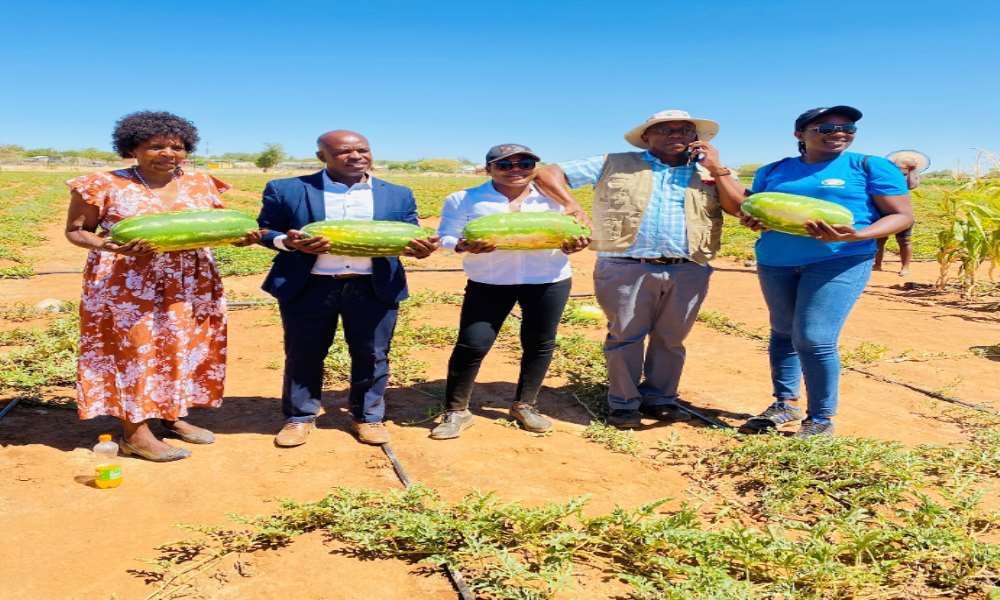Building a brighter future for agriculture
Parliamentary Standing Committee on Natural Resources undertakes follow-up visit to Fransfontein Community Garden
The Environmental Investment Fund of Namibia (EIF), in conjunction with the ministry of agriculture, water and land reform, is implementing a Green Climate Fund (GCF)-funded project titled: 'Improving Rangeland and Ecosystem Management Practices of Smallholder Farmers Under Conditions of Climate Change in Sesfontein, Fransfontein and Warmquelle Areas' (IREMA Kunene Project). The project aims to contribute to the reduction of the vulnerability of smallholder farmers under climate change conditions by safeguarding natural capital to sustain agricultural production systems.
In August, the Parliamentary Standing Committee on Natural Resources visited the Kunene Region to become acquainted with the activities of GCF-funded projects being carried out by the EIF. The tour's goal was to examine the impact of climate change and to inspect progress made in terms of IREMA project's activities/interventions.
Farmers in the region have faced a lengthy drought, which has resulted in significant animal losses and made crop production a massive problem.
The project has taken the initiative to come up with innovative measures to address climate-driven vulnerabilities, such as retrofitting waterpoints with solar systems to ensure adequate supply of potable water, rehabilitating community gardens in Sesfontein and Fransfontein, distributing drought-tolerant seeds to smallholder farmers to boost backyard gardening, and distributing fuel-efficient stoves to local farmers to minimise pressure from limited forest resources in the region.
The Fransfontein Community Garden, worth N$ 12.3 million, is one of the capital interventions visited by the standing committee on 7 December. The garden was still in its infancy during the committee's first visit, with a focus on production and the establishment of a governing framework.
As a result, members of the committee agreed to return to see its first bumper harvest.
The tour began with a courtesy visit to Magrietha Haradoes, a local farmer and recipient of the IREMA Project's Small Stock Revolving Scheme (SSRS). The project provided the beneficiary with 20 ewes and one ram in November 2020. She now has 47 goats and has already rotated five ewes through the revolving mechanism.
"I've accomplished this by dedication, hard work and commitment, as I herd the goats by myself," she explained.
She encouraged fellow recipients to take good care of their goats in order for this revolving initiative to assist as many needy farmers/households in Kunene as possible. Member of the standing committee, Maria Kamutali, expressed gratitude to the recipient, urging her to continue working hard and providing a good example.
The committee then went to the Fransfontein Community Garden to see its plentiful produce. Johannes Antsino, representing the Kunene governor, welcomed the garden's development, adding that the intervention is timely because it answers concerns and addresses challenges government alone cannot resolve.
“Agriculture is close to our hearts and there is no doubt that the Fransfontein Community Garden will enhance food security in the settlement, and has the potential to generate substantial income for the community,” he added.
He went on to say that the more we buy from other countries, the more employment we create for them. As a result, he concluded that these community projects are worth replicating in other areas of Kunene and throughout Namibia.
Business strategy executive Aina-Maria Iteta represented the EIF and thanked all stakeholders for their ongoing support of the community garden. She encouraged lawmakers to develop regulations and ways to help local farmers offset their products through local marketplaces.
Tjekero Tweya, chairperson of the standing committee, was overjoyed to see the garden in full bloom. He urged its management committee, beneficiaries and all other stakeholders to work hard to keep the garden productive so that it can continue to serve the Fransfontein community and nearby areas. He also recommended an exit strategy and good governance to ensure the community garden's long-term viability.



